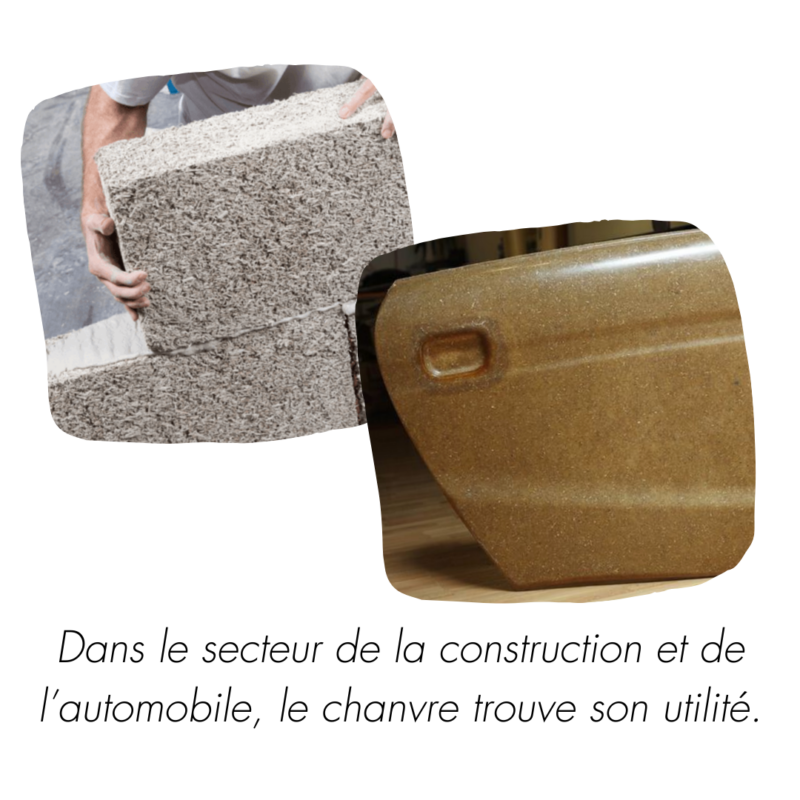We aspire to make the world a more sustainable place, and bio-based plastics can be at the heart of this revolution. These plastics, derived from renewable materials, offer an environmentally-friendly solution to the problems posed by traditional, petrochemical-based plastics. A concrete example of a 100 % biobased plastic is PLA (polylactic acid). It comes from renewable resources such as maize or sugar cane and is obtained through a fermentation process. Where does our favourite plant fit into all this? Is it possible to produce hemp-based plastics? And what are the benefits? Read on to find out.
Hemp in the spotlight
Hemp, which can be grown locally in Belgium, is emerging as a prime option for producing a plastic that is more respectful of our planet.
The hemp fibre used to make this revolutionary plastic is obtained from the stalk of the plant. This fibre produces a plastic that is stronger, less polluting and much lighter than traditional plastic.
The benefits of hemp



Renewable : Hemp grows quickly and requires little water. Its root system also improves soil quality.
Low Environmental Impact : Hemp cultivation generally does not require the use of pesticides, making it a more environmentally-friendly option.
Biodegradable : Hemp-based bioplastics decompose naturally quickly without releasing toxic substances, thereby protecting the health of our planet. For example, adding hemp to composite plastics reduces the use of petrochemical-based plastics.
Hemp-based composite plastics: a powerful alliance

Composite plastics, which blend plant fibres with other polymer materials, are opening up new opportunities in industry. These composite elements offer a unique combination of strength and lightness, while reducing dependence on non-renewable materials.
Perhaps you've already heard of incorporating plant fibres into building materials? Hemp, an excellent acoustic and thermal insulator, is a component of choice for these materials. Strong and durable, it is used to insulate pitched roofs, wooden floors, ceilings, walls and facades, thereby reducing the carbon footprint of construction projects. In the automotive industry, some manufacturers (Peugeot, Mercedes-Benz, BMW) have adopted hemp-based plastics, particularly for insulating door panels.
Hemp-based bioplastics, a step towards the future greener

Bioplastics are materials made entirely from renewable sources, such as plants. Traditional plastics, on the other hand, are made from petrochemicals.
Some of these bioplastics have qualities superior to those of conventional plastics. One of these is biocompatibility, which makes these bioplastics very useful, particularly in the medical and food sectors, where packaging materials need to be biocompatible and biodegradable.¹
The concept of biocompatibility applies to anything that is compatible with the development of living organisms. In materials science, it refers to the ability of materials not to interfere with or degrade the biological environment in which they are used (usually animals).²
Bioplastics are therefore at the forefront of sustainable innovation. One promising example is the development of biodegradable packaging films based on hemp plastic. Hemp, a renewable raw material, keeps temperature-sensitive goods warm or cold during transport. These films offer packaging performance comparable to that of traditional plastics, while decomposing naturally at the end of their life, thus avoiding plastic pollution.
Things to remember
Hemp is emerging as a key player in the quest for sustainable solutions for the future of our planet. From hemp-based composite plastics to bioplastics, the potential for hemp to shape a less polluting future is immense.
The environmental benefits of hemp are many: fast growth, a low carbon footprint and minimal or non-existent use of pesticides. Thanks to its incredible robustness, it can be grown almost anywhere! In Belgium, the quality of our soil and the particularities of our climate suit it very well. We have local players who are launching initiatives to exploit the full potential of hemp.
All these characteristics make hemp an ideal candidate for the production of environmentally-friendly plastics. Thanks to hemp, we can not only reduce our environmental footprint but also actively contribute to the transition towards a circular economy that respects the planet.
Did you know about hemp-based plastics?
Want to find out more about the possibilities hemp has to offer, particularly in the food sector? Check out our latest article, which tells you all about hemp seeds !
Find us on Instagram and Facebook to keep up to date with our latest news!



